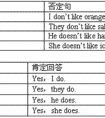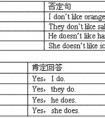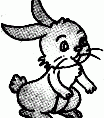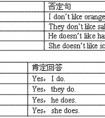按要求改写句子。1. Mr. Wood teaches us math. (改为一般疑问句) ____________ Mr. Wood ____________us math? 2. I have a yellow dress. (改为否定句) I ________-六年级英语
I think that he doesn’t know it at all. 我想他对那一点也不知道。
I suppose that it is not enough to remember the words if you want to learn the language well. 我认为如果你想把这门语言学好,那么只记单词是不够的。
I believe that you can’t help singing our national anthem when you win the first place in the Olympic Games. 我相信当你在奥运会上获得第一名时你会情不自禁地唱起国歌来。
7.当宾语从句中含“no”、“nothing”、“nobody”、“nowhere”、“hardly”、“seldom”、“little”、“few”等否定词或半否词时,否定不转移。如:
I believe that nothing can make me give it up. 我想任何事情也不能使我放弃。
I think that no one can escape if the ship sinks in the sea. 我认为如果这艘船沉入海底的话,那么谁也逃不掉。
I suppose that he is a man of few words. 我猜想他是一个言语不多的人。
考点名称:there be 句型
- There be句型:
是英语中常用句型,意思是“有”,表示“人或事物的存在”。
There在此结构中是引导词,已经没有副词“那里”的含义。
There be后面的名词是句子的主语,属倒装结构。常用“There + be+名词+地点/时间状语”的结构。 - There be结构的用法:
A、肯定结构:
There be句型的肯定结构表示“某处存在某物或某人”或“某时发生某事”。
a. There is+单数可数名词/不可数名词+地点/时间状语。
例:There is a cat under the chair. 椅子下面有一只猫。
There is some water in the bottle. 瓶子里有些水。
b. There are +复数名词+地点/时间状语。
例:There are some apples in the basket. 篮子里有一些苹果。
B、否定结构:There be句型的否定结构是在谓语动词be的后面加“not (any)”或“no”.
例:There are no tables in the room. 或者There are not any tables in the room. 房间里没有桌子。
C、疑问结构:There be句型变成疑问式时,要把there和谓语动词be的位置互换。
例:Is there a pen in the schoolbag? 书包里有一支笔吗? - Therebe结构和have的区别与联系:
1.区别点:
there be 意为存在,强调某地有某物,不表示所属关系;
have 表示所有关系, 强调某人或某地有某物,这是其基本用法。如:
There are some trees in front of the house.房前有些树。
Tom has many friends in China.汤姆在中国有许多朋友。
2.相同点:
在表示结构上的含有时,既可以用there be 句型,也可以用have(has) 来表示。如:
中国有许多长河。
There are many long rivers in China.
China has many long rivers.
三月份有多少天?
How many days are there in March?
How many days has March? - There be结构中的be动词的确定:
A、there be 结构中的谓语动词be在人称和数上应与其后的主语保持一致。主语是不可数名词或单数可数名词时用is,是复数时用are。
例:There is a flower in the bottle. 瓶里有一朵花。
There is some money in the purse. 钱包里有些钱。
B、若句子中有几个并列的主语时,be的形式要与离其最近的一个主语在人称和数上保持一致。
例:There is a boy, a girl and two women in the house. 房子里有一个男孩,一个女孩和两个妇女。
There are ten students and a teacher in the office. 办公室里有十个学生和一个教师。
There be结构的句型转换:
A、否定句:
there be的否定式通常在be后加not构成(在口语中be时常与not缩写在一起)。如果句中有some,一般要变成any。 例:
There are some children in the picture.
There aren't any children in the picture.
B、一般疑问句及其答语:
把be提到there前,首字母大写,句末用问号即可。其肯定答语是Yes, there is / are;否定答语为No, there isn't / aren't。 例:
— Are there two cats in the tree?
— Yes, there are. (No, there aren't.)
C、特殊疑问句及其回答
a. 提问句子的主语(包括主语前的修饰语)时,句型一律用“what is+地点介词短语?”(无论主语是单数还是复数都用is)。
例:There are some birds in the tree. → What's in the tree?
b. 就there be后面的地点状语进行提问时,句型用“where is/ are+主语?”
例:There is a car in the street. → Where is the car?
c. 提问可数名词(主语)前的数量时,用how many,句型结构为“how many+ 复数名词+are there+其它)”(主语无论是单数还是复数,be通常要用are)。
例:There are three books on the desk. → How many books are there on the desk?
- 最新内容
- 相关内容
- 网友推荐
- 图文推荐
上一篇:— Are mitts and mittens the same?— ______________[ ]A. Yes, it is.B. Yes, they are.C. No, it isn't.D. No, they aren't.-六年级英语
下一篇:根据要求写句子。1. Danny wants to learn Chinese. (改为一般疑问句) _____________ _____________ _____________ to learn Chinese? 2. Three lines make a triangle.-六年级英语
零零教育社区:论坛热帖子
| [家长教育] 孩子为什么会和父母感情疏离? (2019-07-14) |
| [教师分享] 给远方姐姐的一封信 (2018-11-07) |
| [教师分享] 伸缩门 (2018-11-07) |
| [教师分享] 回家乡 (2018-11-07) |
| [教师分享] 是风味也是人间 (2018-11-07) |
| [教师分享] 一句格言的启示 (2018-11-07) |
| [教师分享] 无规矩不成方圆 (2018-11-07) |
| [教师分享] 第十届全国教育名家论坛有感(二) (2018-11-07) |
| [教师分享] 贪玩的小狗 (2018-11-07) |
| [教师分享] 未命名文章 (2018-11-07) |





![____ it got four wheels?[ ]A. Have B. There C. Has-五年级英语](http://www.00-edu.com/d/file/ks/4/1/65/2019-08-31/small2ca0aeba76320ba6f81e40fe83a0e8111567199443.png)
